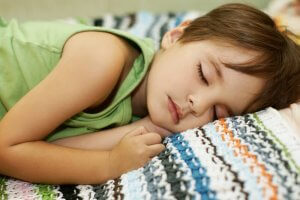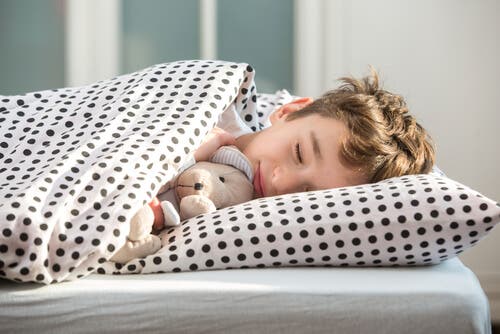How Rest Affects Academic Performance

It’s important to understand how rest affects academic performance in children and adolescents. Sleep deprivation can have negative effects on attention, concentration, memory, and physical health, among others.
Therefore, it’s essential for students, whether they’re children or adolescents, young people or adults, to have good sleep habits. Thus, initially, it’s parents’ responsibility to instill good sleep guidelines in their children.
“Sleep is that golden chain that ties health and our bodies together.”
– Thomas Dekker –
How rest affects academic performance
Sleeping allows the body to recover the energy used during the day. In other words, rest is a biological repair mechanism. In addition, sleep is necessary to integrate the new information acquired, consolidating learning.
Sleep is the time of day when, at the neurological level, the brain gets to work and relates concepts, ideas, and theories. This implies a better memory capacity and, therefore, a better academic performance.
In this sense, authors Medeiros, Mendes, Lima, and Araujo found a correlation between sleep quality and academic performance. Thus, going to bed late, not getting enough sleep, and irregular sleep patterns correlate with poor academic performance.

Thus, students seem to need optimal sleep to properly process information, facilitating the learning process.
But when we talk about rest, we aren’t only referring to night sleep but also to the importance of taking a few minutes to relax during study sessions, since taking breaks when studying is beneficial, as it allows students to concentrate more easily.
Good sleep guidelines to get better sleep
Firstly, we should note that children need more sleep than adults. In fact, the number of hours they need to get good rest decreases as they grow.
According to the Spanish Society of Pediatric Outpatient and Primary Care (SEPEAP), it’s advisable for people to sleep for the following hours, according to their age:
- Children between the ages of three and five have to sleep 12 and a half hours a day.
- Children between the ages of six and 12 should sleep nine and a half hours a day.
- From the ages of 12 to 18, they should sleep eight and a half hours.
- Adults need an average of seven and a half hours of sleep a day to perform properly.

In addition, for these sleep hours to be effective, it’s recommended to establish a series of good behaviors and habits to get good sleep. In this sense, according to authors Mastin, Bryson, and Corwyn, these are some of the guidelines you should follow:
- Avoid taking long naps during the day.
- Go to sleep and wake up at the same time every day.
- Avoid physical activity before bed.
- Avoid video games, television, or any stimulating task before bed.
- Don’t use the bed for other activities, such as reading, studying, and eating, among others.
- Sleep in a comfortable bed.
- Avoid studying or doing homework before bed.
- Sleep in a room with low lighting and little ambient noise.
Conclusion on how rest affects academic performance
Parents need to ensure that children apply and assimilate these guidelines before bed so that they internalize them and they become part of their routine habits. This way, their children’s academic performance won’t be affected by sleep and rest problems.
It’s important to understand how rest affects academic performance in children and adolescents. Sleep deprivation can have negative effects on attention, concentration, memory, and physical health, among others.
Therefore, it’s essential for students, whether they’re children or adolescents, young people or adults, to have good sleep habits. Thus, initially, it’s parents’ responsibility to instill good sleep guidelines in their children.
“Sleep is that golden chain that ties health and our bodies together.”
– Thomas Dekker –
How rest affects academic performance
Sleeping allows the body to recover the energy used during the day. In other words, rest is a biological repair mechanism. In addition, sleep is necessary to integrate the new information acquired, consolidating learning.
Sleep is the time of day when, at the neurological level, the brain gets to work and relates concepts, ideas, and theories. This implies a better memory capacity and, therefore, a better academic performance.
In this sense, authors Medeiros, Mendes, Lima, and Araujo found a correlation between sleep quality and academic performance. Thus, going to bed late, not getting enough sleep, and irregular sleep patterns correlate with poor academic performance.

Thus, students seem to need optimal sleep to properly process information, facilitating the learning process.
But when we talk about rest, we aren’t only referring to night sleep but also to the importance of taking a few minutes to relax during study sessions, since taking breaks when studying is beneficial, as it allows students to concentrate more easily.
Good sleep guidelines to get better sleep
Firstly, we should note that children need more sleep than adults. In fact, the number of hours they need to get good rest decreases as they grow.
According to the Spanish Society of Pediatric Outpatient and Primary Care (SEPEAP), it’s advisable for people to sleep for the following hours, according to their age:
- Children between the ages of three and five have to sleep 12 and a half hours a day.
- Children between the ages of six and 12 should sleep nine and a half hours a day.
- From the ages of 12 to 18, they should sleep eight and a half hours.
- Adults need an average of seven and a half hours of sleep a day to perform properly.

In addition, for these sleep hours to be effective, it’s recommended to establish a series of good behaviors and habits to get good sleep. In this sense, according to authors Mastin, Bryson, and Corwyn, these are some of the guidelines you should follow:
- Avoid taking long naps during the day.
- Go to sleep and wake up at the same time every day.
- Avoid physical activity before bed.
- Avoid video games, television, or any stimulating task before bed.
- Don’t use the bed for other activities, such as reading, studying, and eating, among others.
- Sleep in a comfortable bed.
- Avoid studying or doing homework before bed.
- Sleep in a room with low lighting and little ambient noise.
Conclusion on how rest affects academic performance
Parents need to ensure that children apply and assimilate these guidelines before bed so that they internalize them and they become part of their routine habits. This way, their children’s academic performance won’t be affected by sleep and rest problems.
All cited sources were thoroughly reviewed by our team to ensure their quality, reliability, currency, and validity. The bibliography of this article was considered reliable and of academic or scientific accuracy.
- Mastin, D. F., Bryson, J., & Corwyn, R. (2006). Assessment of sleep hygiene using the Sleep Hygiene Index. Journal of behavioral medicine, 29(3), 223-227.
- Medeiros, A., Mendes, D., Lima, P. y Araujo, J. (2001). The relationships between sleep-wake cycle and academic performance in medical students: A cross-sectional study. Biological Rhythm Research, 32, 263–270.
- Sociedad Española de Pediatría Extrahospitalaria y Atención Primaria. (2014). La importancia del sueño en la salud de los escolares. Recuperado de: https://www.sepeap.org/wp-content/uploads/2014/02/La-importancia-del-sue%C3%B1o-en-la-salud-de-los-escolares.pdf
This text is provided for informational purposes only and does not replace consultation with a professional. If in doubt, consult your specialist.








